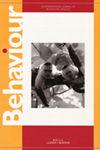捕食的高风险抑制了大胆和害羞的社会猎物个体的行为差异
IF 1
4区 生物学
Q4 BEHAVIORAL SCIENCES
引用次数: 0
摘要
猎物必须努力优化觅食成功率,同时降低被捕获的概率。在社会猎物群体中,个体之间大胆害羞性格的内在差异会影响他们各自的冒险倾向。我们研究了金鱼(Carassius auratus)混合群的觅食和避难所使用行为,这些金鱼包括半大胆的个体和半害羞的个体,在不同程度的捕食者(Egretta garzetta)的捕食风险下。在群体层面上,当捕食者在焦点池呆的时间更长时,鱼类群体在避难所呆的时间更多,从而显著减少了觅食时间。不出所料,大胆的鱼往往是第一个离开避难所的,在控制条件下和风险水平较低的情况下,它们比害羞的鱼更经常在避难所外觅食。然而,在风险较高的条件下,大胆和害羞的鱼之间的行为差异消失了。就死亡率而言,捕食者捕获的大胆鱼类明显多于害羞鱼类。我们的研究表明,社会群体中大胆的个体往往会冒更大的风险来获得觅食成功,但也表明,在捕食风险增加的时候,大胆的先天差异可以减少。本文章由计算机程序翻译,如有差异,请以英文原文为准。
High risk of predation suppresses behavioural differences among bold and shy social prey individuals
Prey animals must attempt to optimize foraging success while reducing the probability of being captured. Within social prey groups, intrinsic differences in bold-shy personality among individuals influence their respective risk-taking tendencies. We examined the foraging and refuge use behaviour of mixed groups of goldfish (Carassius auratus) containing half bold individuals and half shy individuals under variable levels of predation risk from a live avian predator (Egretta garzetta). At the group level, the fish groups significantly decreased their foraging time by spending more time under the refuge when the predator spent more time at the focal pool. As expected, the bold fish tended to be the first to leave the refuge, and foraged outside the refuge more often than shy fish under control conditions and at lower risk levels. However, the behavioural differences between bold and shy fish disappeared under higher risk conditions. In terms of mortality, the predator captured significantly more bold fish than shy fish. Our study illustrates how bold individuals in social groups often take greater risks to achieve foraging success, but demonstrates that innate differences in boldness can be diminished in times of elevated predation risk.
求助全文
通过发布文献求助,成功后即可免费获取论文全文。
去求助
来源期刊

Behaviour
生物-动物学
CiteScore
1.80
自引率
7.70%
发文量
44
审稿时长
3 months
期刊介绍:
Behaviour is interested in all aspects of animal (including human) behaviour, from ecology and physiology to learning, cognition, and neuroscience. Evolutionary approaches, which concern themselves with the advantages of behaviour or capacities for the organism and its reproduction, receive much attention both at a theoretical level and as it relates to specific behavior.
 求助内容:
求助内容: 应助结果提醒方式:
应助结果提醒方式:


